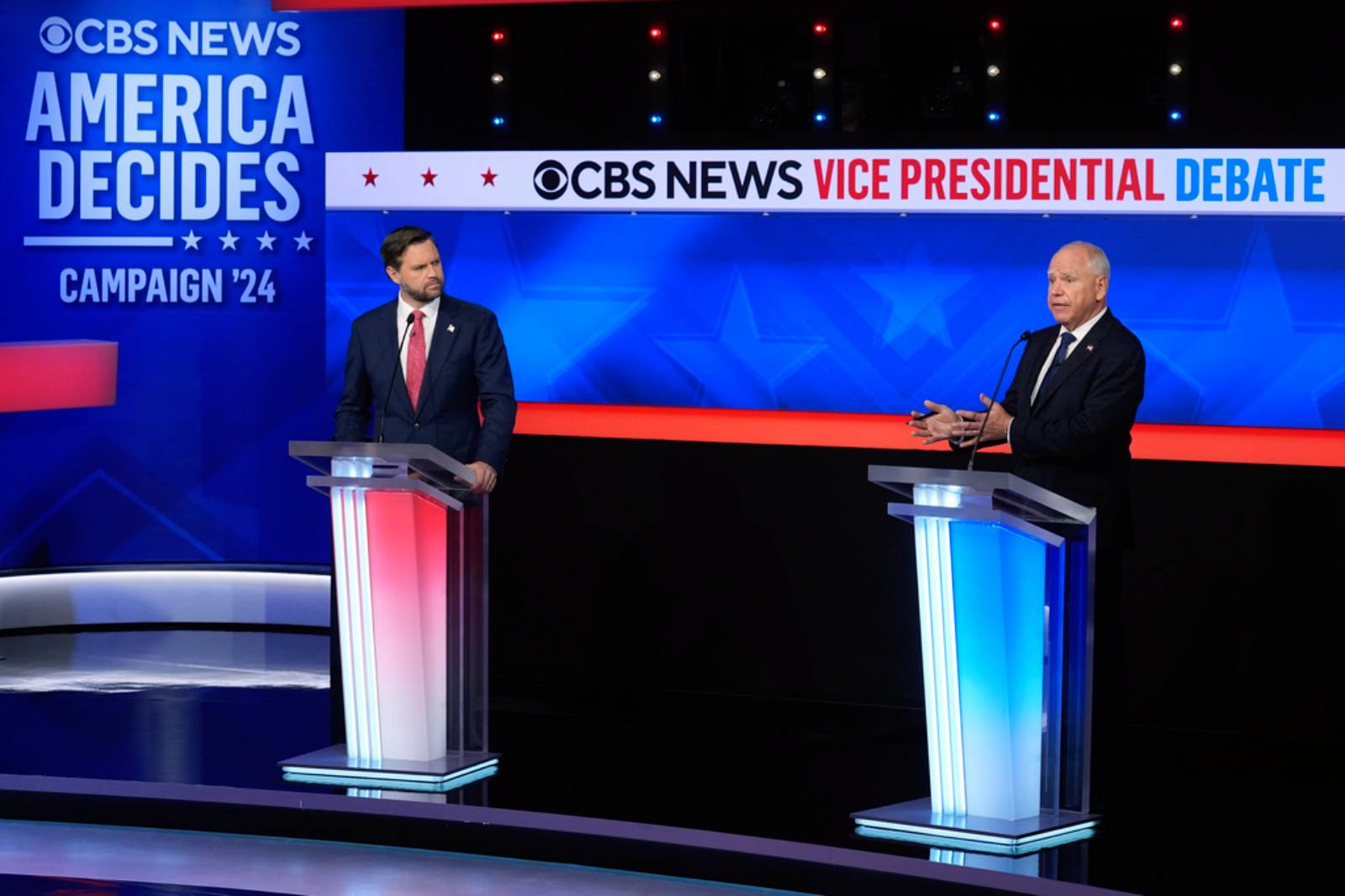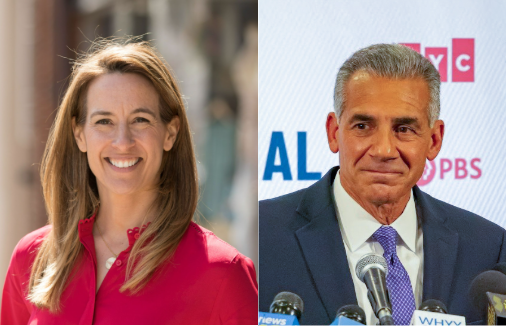On October 1, vice presidential contenders JD Vance and Tim Walz faced off at the CBS Broadcast Center in New York City for the 2024 Vice Presidential Debate. After the much-anticipated presidential debate between Donald Trump and Kamala Harris, the subsequent showdown between their running mates was held to the same expectation. And, despite some moments of tension that involved the muting of microphones, it was conceivably the most civil debate of the 2024 election campaign.
In a relatively strained conversation, the two candidates sparred over matters including international conflict, immigration, the economy, and abortion rights. However, both senators repeatedly agreed with one another throughout the debate, the word appearing more than two dozen times during the 90 minutes that aired. The following lists each opponent’s argument (or agreement) over some of the subjects discussed.
The Conflict in the Middle East
The first question concerned the conflict in the Middle East, which was especially pressing since Iran launched a missile attack on Israel—for which Prime Minister Benjamin Netanyahu vowed retaliation—just hours before the debate. Appearing startled, Walz reiterated Harris’s promise of supporting Israel.
“The expansion of Israel and its proxies is an absolute fundamental necessity for the United States to have the steady leadership there.” He promised “steady leadership” under Harris, a remark that Vance ridiculed.
Meanwhile, Vance assured “peace through strength” under the Trump administration. Still, he claimed that it was ultimately “up to Israel what they think they need to do to keep their country safe, and [the United States] should support our allies wherever they are and when they’re fighting the bad guys.” He pointedly noted that the Hamas attacks on Israel on Oct.7, 2023, happened “during the administration of Kamala Harris.”
Yet, neither opponent stated if they approved of a deterrent strike by Israel on Iran.
The Economy
Walz was asked to explain his and Harris’s unveiled economic plan, including billions of dollars in tax credits concerning “manufacturing, housing, and a renewed child tax credit,” which raised questions on whether the US economy could support this plan.
Walz expressed how he and Harris are establishing economic plans specifically for the middle class, which is where they both come from. Walz has also promoted their housing plan, showing its effectiveness through the 12% increase in housing and a 4% reduction in housing rent in Minnesota. Walz also claimed that he and Harris have provided $6,000 in child tax credits.
Similarly to Walz, the Wharton School concluded that Trump’s plan would result in an increase of the country’s deficits by $5.8 trillion. In response, Vance defended Trump’s economic plan, putting an emphasis on how his housing plan has caused the highest “take-home pay” in this generation and has ousted inflation. In general, Vance strongly encourages people to have faith in Trump’s economic plans, referencing the “record he delivered: rising take-home pay for American workers.”
Abortion
Walz and Vance expressed their contrasting viewpoints on the constant dispute about abortion access and procreative rights. Vance reasoned that to protect “innocent life” and the vulnerable, he believes in providing women options, specifically fertility treatments. Hence, the Ohio senator proposed his plan for individual states to have the power to establish their abortion policies, as we live in a country of rich diversity in every state.
In contrast, Walz argues that this fundamental right for women should not be determined “by geography.” The governor of Minnesota believes that abortion is a “basic human right” for all women in all states, bringing up the fact that Texas’s maternal mortality rates have soared after the overturning of Roe v. Wade. Again, he referred back to his home state of Minnesota, speaking of how Minnesotans make sure that women are in control of their healthcare with abortion being legal. Throughout his response, Walz spoke of the death of Amber Thurman, who died from sepsis due to not being able to get abortion treatments. On this tragic death, Vance agreed that “Amber Thurman should still be alive.”
Immigration
Vance was asked an important question regarding Trump’s plans for mass deportation of illegal immigrants across the Mexico-US border, the question being whether he would separate parents who crossed the border illegally from their children who are US citizens. Instead of addressing this question, Vance focused on issues that arose due to loose border control, including labor factors, the fentanyl crisis, and the kidnapping of children.
“A lot of people will go home if they can’t work for less than minimum wage in our own country…that will be good for our workers who just want to earn a fair wage for doing a good day’s work,” Vance said.
However, both Walz and Vance agreed that increased migration — both legal and illegal — has caused a growth in the labor force in recent years, allowing more employment positions without an increase in prices.
On the counterpart, Walz continued on Harris’s argument that Trump “killed a bipartisan Senate deal” to tighten border security and increase the functionality of the processing system for immigrants and asylum seekers. Walz noted that Republicans only agreed with the former president when he stated that the plan “wasn’t good enough.”
Healthcare
Under the Trump administration, Trump had repeatedly attempted to repeal the Affordable Healthcare Act. During the debate, questions arose regarding whether Trump would continue his efforts if elected in the upcoming election. Vance had formerly stated that insurers should be allowed to cover the ill separately from the healthy. He added that Trump prefers to “allow states to experiment a little bit on how to cover both the chronically ill and the non-chronically ill.”
Walz argued that Vance’s statement was basically allowing “insurance companies pick who they insure,” which increases the chances of old and chronically ill people getting kicked out of their healthcare.t He further mentioned that Vance’s concept was similar to that of pre-Obamacare, and emphasized that Harris would protect and enhance the Affordable Care Act.
Climate Change
In the wake of Hurricane Helene, Vance was asked to respond to Trump’s past claims of global warming being a “hoax.” Evasive in his answer, Vance mentioned that the Biden administration had been overlooking issues with jobs and manufacturing by overly focusing on climate change.
“If the Democrats believe that climate change is serious, what they would be doing is more manufacturing and more energy production in the United States of America, and that’s not what they’re doing,” Vance said.
Vance argued that the best method to combat climate change was increasing domestic manufacturing. As most solar panels—a solution praised by the Democratic party for clean energy—are produced in China, creating products to address climate change within the U.S. would be a better alternative because it has the world’s cleanest energy economy.
Similarly, Walz’s answer entailed a domestic solution as well. He commended the Biden administration for its record-high levels of oil and natural gas production, as well as renewable energy investments. “You can see us becoming an energy superpower in the future,” Walz said.
From debating on essential topics including conflicts in the Middle East to climate change, both vice presidential candidates clearly expressed their concerns for the nation’s future by providing insightful responses and significant policies. It will only be after election day that one of the two will be able to carry out their proposals in The White House.















